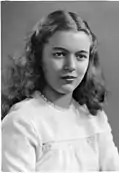May Gorslin Preston Slosson
May Gorslin Preston Slosson (10 September 1858, Ilion, New York – 26 November 1943, Ann Arbor, Michigan) was an American educator and suffragist. She was the first woman to obtain a doctoral degree in Philosophy in the United States.
May Gorslin Preston Slosson | |
|---|---|
.jpg.webp) | |
| Born | May Gorslin Preston September 10, 1858 |
| Died | November 26, 1943 (aged 85) |
| Alma mater | Bachelor of Science (1878) and Master of Science (1879), from Hillsdale College; Ph.D. from Cornell University (1880) |
| Occupation | Educator and suffragist |
| Employer | Professor of Greek at Hastings College, Assistant Principal at Sabetha High School, Kansas, chaplain at Wyoming State Penitentiary |
| Known for | First woman to earn a Ph.D. from Cornell University, and the first woman to obtain a doctoral degree in Philosophy in the United States. |
| Spouse(s) | Edwin Emery Slosson |
| Children | Two sons |
| Parent(s) | Reverend Levi Campbell Preston, Mary Gorslin Preston |
Life
May Gorslin Preston was the daughter of Reverend Levi Campbell Preston and the former Mary Gorslin. Her family moved to Kansas from New York State.[1] She earned Bachelor of Science (1878) and Master of Science (1879) degrees from Hillsdale College in Michigan.[2] In 1880 she became the first woman to earn a Ph.D. from Cornell University, and the first woman to obtain a doctoral degree in Philosophy in the United States.[3] Her thesis was entitled Different Theories of Beauty.[4]

After obtaining her PhD she became a professor of Greek at Hastings College in Nebraska, and was later Assistant Principal at Sabetha High School in Kansas. She married Edwin Emery Slosson in 1891 in Centralia, Kansas and moved with him in 1892 to Laramie, Wyoming, where he had been appointed professor of Chemistry at the University of Wyoming. Their son Preston William Slosson, born in Laramie in 1892, went on to have a long career as professor of History at the University of Michigan.[5] A younger son, Alfred Raymond, died in childhood of scarlet fever.[6] Preston's daughter, Flora May Slosson attended the University of Michigan as well.[7]
May Preston Slosson organized a series of Sunday afternoon lectures for the prisoners at the Wyoming State Penitentiary in Laramie, to be given by University of Wyoming professors. She was also a speaker in the series. When the position of chaplain at the nearly all-male prison became vacant in 1899, she was appointed to the position at the request of the inmates and remained in the role until 1903.[8] Her work at the prison is commemorated by the Dr. May Preston Slosson Historical Lecture Series held at the Wyoming Territorial Prison State Historic Site.[2][9] She moved with her family to New York City in 1903.
While living in Wyoming, May Preston Slosson had enjoyed rights that other states denied to women, including the right to vote.[10] After moving to New York, both she and her husband were active in the women's suffrage movement.[2][11] In 1920 she published a book of poems, From a Quiet Garden, Lyrics in Prose and Verse.[12]
References
- Slosson, Preston W. (1930). "Edwin E. Slosson, Pioneer, by His Son". A Number of Things. New York: Harcourt, Brace and Company. pp. 3–33.
- Bennicoff, Tad (15 March 2012). "Open Minds Open Doors". Smithsonian Institution Archives. Retrieved 25 October 2012.
- Rogers, Dorothy (2005). America's first women philosophers: Transplanting Hegel, 1860-1925. London: Continuum. p. 17. ISBN 9781847143006.
- "May Gorslin Preston Slosson (1858-1943)". Acc. 90-105 - Science Service, Records, 1920s-1970s, Smithsonian Institution Archives. Smithsonian Institution Archives. Retrieved 4 April 2012.
- Price, Jacob M. "Preston W. Slosson Memorial". Faculty History Project. University of Michigan. Retrieved 15 November 2012.
- "Child's sad death". Laramie Weekly Boomerang. 4 October 1900. p. 6. Archived from the original on 20 Mar 2009. Retrieved 15 November 2012.
- Institution, Smithsonian (2011-10-12), Flora May Slosson Wuellner, retrieved 2020-04-12
- De Cordova, Rudolph (1903). "A Lady prison chaplain". Wide World Magazine. 10: 500–504. Retrieved 15 November 2012.
- "Wyoming Territorial Prison State Historic Site". Archived from the original on 10 February 2013. Retrieved 15 July 2012.
- "WYOMING'S EQUALITY HERITAGE". Retrieved 15 July 2012.
- "Husband talks suffrage for her" (PDF). New York Times. 12 January 1910. p. 9. Retrieved 20 July 2015.
- Slosson, May Preston (1910). From a quiet garden: Lyrics in prose and verse. New York: Brentano's. Retrieved 16 November 2012.
External links
- Mrs. May Slosson dies Obituary from Lawrence (Kansas) Daily Journal-World archived at Google News. Retrieved 15 November 2012.
- May Genevieve Preston at Darlene's Family Genealogy Retrieved 15 November 2012.